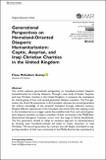Files in this item
Generational perspectives on homeland-oriented diasporic humanitarianism : Coptic, Assyrian and Iraqi Christian charities in the United Kingdom
Item metadata
| dc.contributor.author | McCallum Guiney, Fiona | |
| dc.date.accessioned | 2022-12-22T11:30:02Z | |
| dc.date.available | 2022-12-22T11:30:02Z | |
| dc.date.issued | 2023-06-01 | |
| dc.identifier | 269542776 | |
| dc.identifier | 9d88b1ea-e76e-4465-a9e0-756640a617ba | |
| dc.identifier | 85145480898 | |
| dc.identifier | 000903095000001 | |
| dc.identifier.citation | McCallum Guiney , F 2023 , ' Generational perspectives on homeland-oriented diasporic humanitarianism : Coptic, Assyrian and Iraqi Christian charities in the United Kingdom ' , International Migration Review , vol. 57 , no. 2 , pp. 707-730 . https://doi.org/10.1177/01979183221139145 | en |
| dc.identifier.issn | 0197-9183 | |
| dc.identifier.other | ORCID: /0000-0001-9729-4794/work/125302973 | |
| dc.identifier.uri | https://hdl.handle.net/10023/26646 | |
| dc.description | Funding: This work was supported by the Humanities in the European Research Area, (grant number 291827). | en |
| dc.description.abstract | This article explores generational perspectives on homeland-oriented diasporic humanitarianism by minority diasporas. Through a case study of Coptic, Assyrian, and Iraqi Christian charities in the UK, it compares the motivations for charity-giving of first- and second-generation diaspora members. The first generation has direct life experiences in the homeland, whereas the second generation has indirect knowledge of the ancestral homeland through collective memory. Despite different experiences of the homeland, the article finds that ongoing crises in the homeland serve as trigger events that mobilize both first- and second- generation diaspora members to support members of their community in the Middle East. Generational divergence, however, occurs over the range of charity beneficiaries. The first generation tended to adopt an exclusive approach to humanitarianism by focusing upon homeland-oriented aid solely to Copts, Assyrians, or Iraqi Christians. The second generation, by contrast, were still deeply committed to supporting members of their own community in the Middle East but also maintained attachment to Egypt or Iraq, as well as to the UK, that resulted in support for additional causes in the homeland and the UK. It is the range of recipients of diaspora charity, rather than mobilization to support the community in the homeland, that was impacted by generational differences. The article’s findings imply that the second generation of minority diasporas are reshaping diasporic humanitarianism by reacting to their connections with both the homeland and host state when identifying charity beneficiaries. | |
| dc.format.extent | 24 | |
| dc.format.extent | 619867 | |
| dc.language.iso | eng | |
| dc.relation.ispartof | International Migration Review | en |
| dc.subject | Faith-based diasporas | en |
| dc.subject | Diaspora humanitarianism | en |
| dc.subject | Middle East Christians | en |
| dc.subject | Migration generations | en |
| dc.subject | BR Christianity | en |
| dc.subject | T-NDAS | en |
| dc.subject | MCC | en |
| dc.subject.lcc | BR | en |
| dc.title | Generational perspectives on homeland-oriented diasporic humanitarianism : Coptic, Assyrian and Iraqi Christian charities in the United Kingdom | en |
| dc.type | Journal article | en |
| dc.contributor.institution | University of St Andrews. School of International Relations | en |
| dc.identifier.doi | https://doi.org/10.1177/01979183221139145 | |
| dc.description.status | Peer reviewed | en |
This item appears in the following Collection(s)
Items in the St Andrews Research Repository are protected by copyright, with all rights reserved, unless otherwise indicated.

